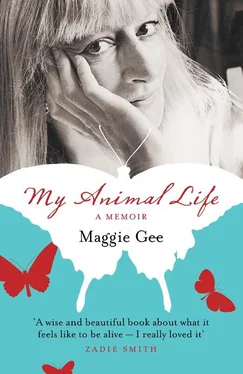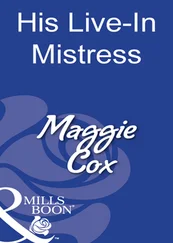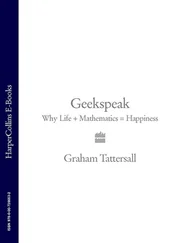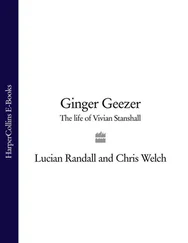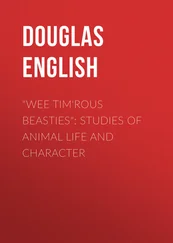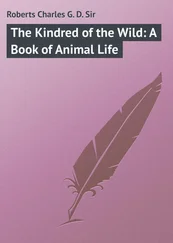I only remember my mother’s mother as a very old lady. Grandma Church was in her eighties when she died, in what must have been 1952, because I was only four and recall for some reason the gaiters and brown checked coat I wore on the day of her death, alas the same day as the death of one of the two spinster Gardiner sisters who lived next door, Miss Lou and Miss Grace. So that I, hopping in from the garden into the kitchen where my mother was crying, still chanting my repeated refrain of the day, ‘Poor Grandma, poor Miss Gardiner,’ was rounded on with natural asperity by my mother, who said, ‘Never mind Miss Gardiner, how about Grandma?’ — and my father made everything worse by telling her off for being unfair. The guilt of having caused my mother double pain still gives me a little stab of unhappiness.
Grandma Church, to me, was an old lady, tall and big for an old lady, who made puzzling jokes and had long ashen and brindled hair wound around her head in a thin coiled sausage, and dark brown tortoise-shell spectacles. She had a fur coat with shiny worn edges that probably came from her employer Mrs Coe, but she still had a smiley mouth, not like the thin lips that most old people had, a feature I always admired in my mother, whose mouth never grew mean or old. Grandma Church would bend over and talk to me, so I liked her even if I never quite understood her, but then children never quite understand grownups, so this seemed nothing remarkable. I remember, one time when Grandma and Grandpa were staying with us at Bromsgrove, a conversation one day on the sunny landing about a hair, which Grandma showed me, and stroked across the palm of my hand (was it growing on her face? Perhaps.) When I reported this to my parents I recall my father looking serious, and saying something to my mother, who said, ‘Oh she’s all right, Vic, never mind.’ This was explained much later when Mum told me that her mother had been ‘senile’ in her last few years but that Grandpa hadn’t helped by ‘taking over everything at home so she felt that she couldn’t do anything at all’.
But what little my Mum also told me made it clear that her mother could have done anything if she had not been born poor. For a start, in the wedding photograph for her marriage to Bill Church, May Davis is strikingly beautiful, by far the best-looking of all the sisters and aunts in attendance, with big dreamy heavy-lidded eyes, full lips, only half-smiling, a small tip-tilted nose and pale blonde hair. Beside her Bill looks swarthy and sensual and Italianate or Jewish, and a little small. The secret of their marriage may have been that she was five years older than him, and thus almost on the shelf. Well, he gave her seven children, and to look at him, sex and laughs. It was May who read to my mother, and made her love books. And this is the puzzle about the Davis side of the family: where did the education come from? Was there money, once, that was lost? Did it trickle away between all those sevenths of sevenths?
Because May’s mother Martha Davis née Leeson, my great-grandma, was a poet of sorts, a strange, sharp-looking woman with a long curving crest of nose, thin witty lips and eyes set so wide they were practically looking in different directions. Fleshy in her middle years, corseted in black with a strict high neck and lace cap, in old age she attained a kind of hawk-like beauty — there is a faded photograph of her in glory, slender once more, mounted straight-backed and imperious on a tall machine which, Aunty Eve assured me, was ‘the first tricycle in Northampton’. Did the money to acquire this style and dash come partly from writing?

Hat competition at the wedding of my maternal grandparents, Bill and May Church
Martha Leeson wrote verses for birthday and Christmas cards, in bulk, and took them to Market Harborough station in a suitcase, where she met a man who paid her, very little I imagine, and took them away. Is rhyme a genetic trick, an echo-receptive angle of the genome, I wonder? My mother could rhyme as easily as breathing, firing off her poems to women’s magazines and winning ten shillings or the ‘star letter spot’ with regularity, and I find it hard not to rhyme when I write prose, and my daughter finds it natural to rap.
Grandma Church’s stubbornness changed my mother’s whole life for the better. Mum was born with a turned-in foot, and May her mother was told by the doctor that she would have to have a caliper; nothing could be done; little Aileen, her seventh child, would always walk with a limp. But May refused to accept it. Instead she carried my mother to and from the nearest hospital every week for treatment, ‘three or four miles’, as mum told me, and another three or four back. It worked; my mother later became a sprinter, hurdler and hockey-player, and I still have the small blackened silver cup that pronounces her Wolverton Grammar School Sports Day’s ‘victrix ludorum’.

Great-grandma Martha Davis née Leeson, writer of birthday-card verses
In other ways Grandma Church had grown tired by the time my mother was born, after all those children, with no money and a husband who drank. That’s probably why she didn’t teach my mother how to sew, or make clothes, because Mum’s elder sisters both had these skills. It must also be why, as my mother told me still with some sadness a lifetime later, ‘Mum never came to any of my school events,’ so Aileen had to shine on sports days unregarded (but she always came to everything that I did, by way of compensation; every play, every parents’ evening, every Sports Day, there Mum would be, with a camera, smiling and cheering me on).
The battle between my parents — who nevertheless loved each other, and all of us — was fought through their families, as marital battles so often are. Gees were martial, while Churches appeased and then secretly deceived. My father was frightening and sometimes aggressive and my mother wasn’t, and ‘a man should lead’, as he asserted, so when conflict was overt, he would always carry the day. When we made our regular visits ‘home’ to Bucks, the division of time was never just. We always stayed at Wolverton, with Pa and Ma, and only walked over the fields to my mother’s home, Stony Stratford, for occasional meals. There my father felt off his ground, and uneasy, particularly, as I think now, after Grandma Church died, when there was just Grandpa Church to deal with, the man who my mother called ‘Dad’, the only plausible other man and authority figure in her life. Though Bill, shambling and laughing in his cardigan and slippers, with mould in his bread-bin and his tribe of seven children dispersed to the four winds, was far from being an authority figure. But he could annoy my father terribly, by making jokes and being funny, and once, I remember, just by saying, ‘Relax, Vic, make yourself at home,’ then going into the kitchen to prepare whatever we were eating, ham and pickled onions, probably, on thick plates, and by the time he returned my father had worked himself into a rage, fulminating to my mother, ‘I AM relaxed, I AM at home, what does he mean?’
Of course my mother minded all this very much. And then, Vic criticised her brothers and sisters, when we were back in our own home and away from the battleground of Wolverton v. Stony Stratford. Eve and Albert were too rich and ‘too selfish to have children’ (which was far from being the case. I only understood how much sadness had been concealed when I was eighteen, and in a moment of revelation, Eve showed me, one day, the life-size blonde figure of a child, a giant doll over four feet tall, which she kept sitting on the sofa, when no one was there. She had called her Annabel. Was that selfish?) Arthur and Frances, also childless and therefore fond of their nieces and nephews, annoyed Dad by generously buying me, in the face of his protests, from Woolworths, the flat gold and silver cardboard crowns I craved, to celebrate the Coronation in 1953; I still remember the row between the grownups afterwards in the hot sunlight on Bromsgrove High Street, the horror of it, my gift poisoned with guilt, wishing I had not asked for it … Uncle Arthur and Aunty Frances never came to stay again.
Читать дальше
